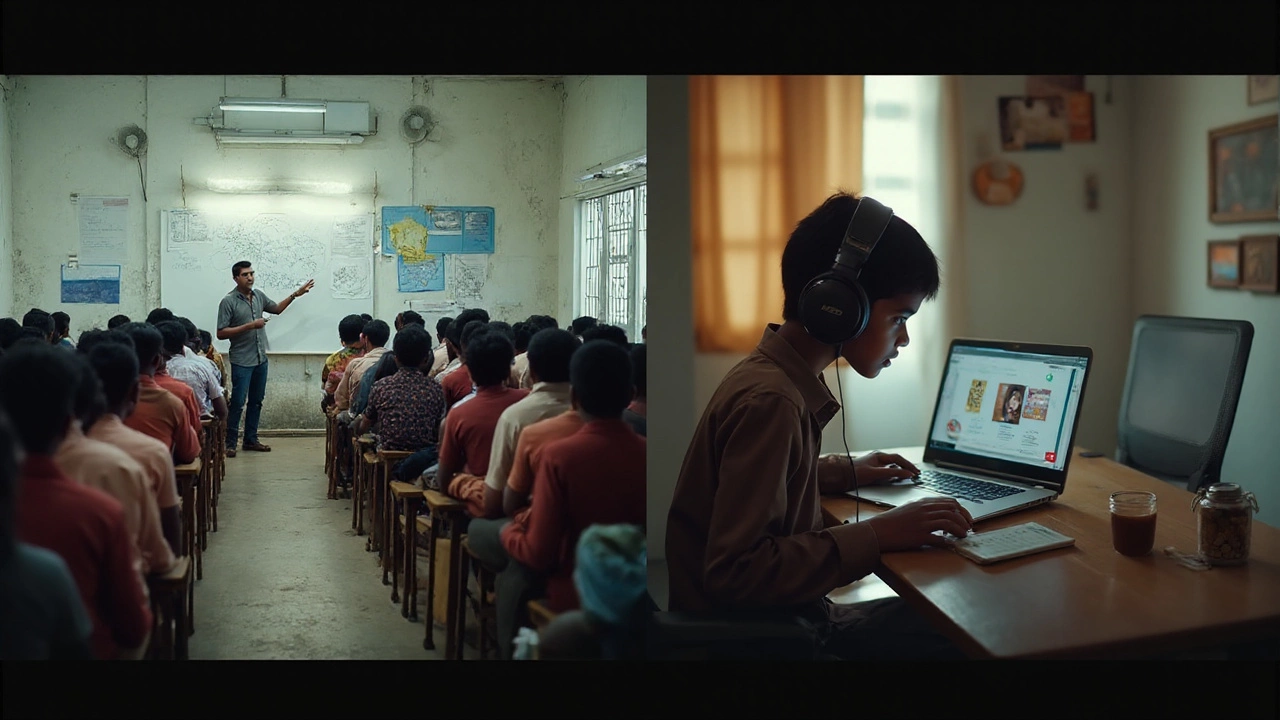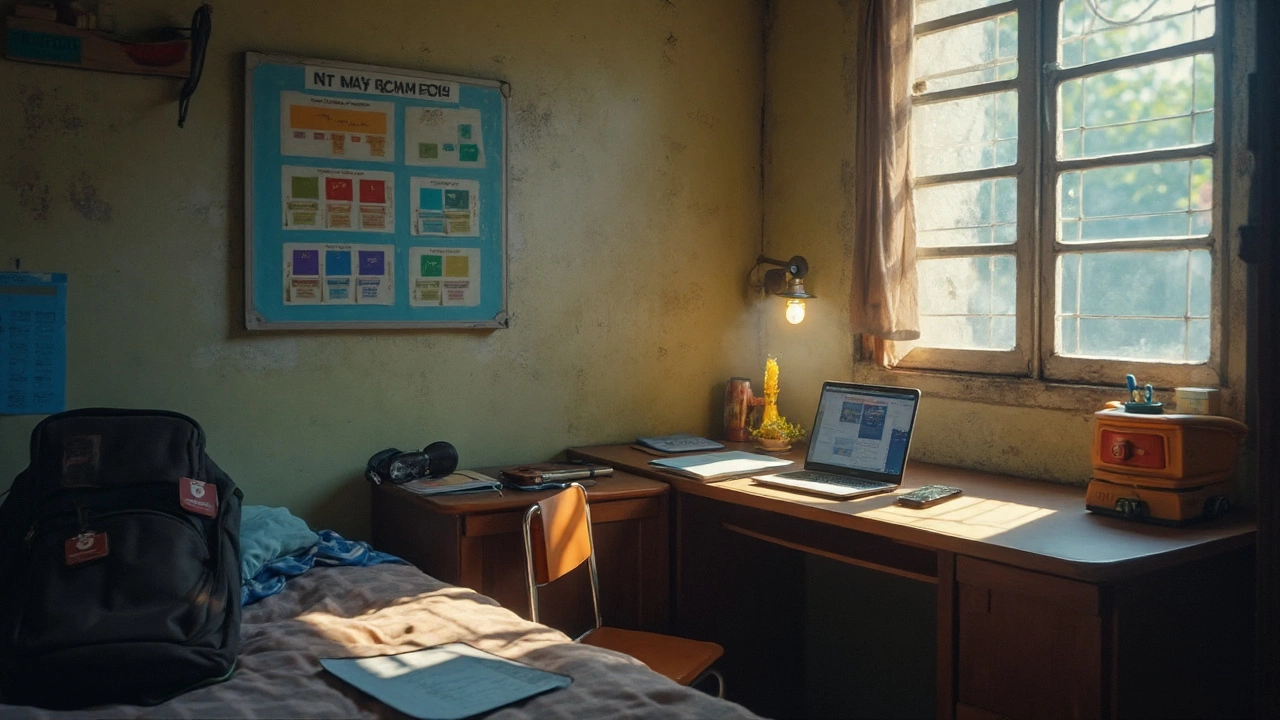
You clicked because you want one clear answer to a messy question: which course actually moves your NEET rank in 2025. Here’s the catch-there isn’t a single brand that’s “best” for everyone. The right pick depends on your basics, discipline, city, budget, and how fast you get your doubts cleared. I’ll cut the noise and show you how to choose with a simple framework, real price ranges, batch sizes, red flags, and a 7‑day test to make sure you don’t waste a year.
Key takeaways
- The “best” NEET course = strong teachers in core topics, fast doubt resolution (under 24-48 hours), weekly testing with analytics, and structured NCERT-first biology.
- Online is cheaper and flexible; offline wins on discipline and peer pressure. Hybrid works for most students who need both.
- Always take real demo classes and a full mock before paying. Track doubt turnaround time yourself.
- Pay for teachers and testing, not flashy apps. A tight test series + doubt support beats add-on features.
- If money is tight: combine low-cost online lectures with a top-tier test series and a local doubt group.
What “best” NEET course means in 2025
“Best” isn’t a logo-it’s a system that lifts your marks across Physics, Chemistry, and Biology and keeps you consistent for 8-12 months. NEET UG is set by the National Testing Agency (NTA). The pattern has four sections-Physics, Chemistry, Botany, Zoology-with Section A (35 Q) and Section B (15 Q). You can attempt 180 out of 200 questions for a total of 720 marks (+4, −1). Most toppers score heavy from NCERT lines in Biology and reduce negative marks in Physics and Chemistry. Keep that in mind while choosing your course.
Use this simple test to judge any course quickly:
- Content quality: Do you understand Physics and Physical Chemistry after class without rewatching 3 times? If not, teaching pace or clarity is off.
- Doubt resolution: Are your questions answered within 24-48 hours with steps, not just the final answer? For offline, can you walk up to a teacher daily?
- Testing and feedback: Do you get a full-syllabus test at least twice a month and an analytics sheet that pinpoints weak chapters?
- NCERT-first Biology: Are classes aligned to line-by-line NCERT with tricky facts highlighted and revised weekly?
- Consistency engine: Does the course give a weekly plan, daily targets, and monitored homework or attendance? If not, you’re on your own.
Here’s a quick reality check from recent numbers. NEET registrations have crossed the 20 lakh mark in recent cycles, while MBBS seats are around the 1.05-1.10 lakh range across India (as per NMC seat matrices). That’s roughly a 1 in 18-20 shot depending on your category and college type. Courses don’t change this math-but the right one lifts you into the right decile.
Rules of thumb I use when advising students:
- Physics decides your rank; Biology decides whether you qualify. If your Physics is weak, pay for smaller batches and faster doubt support.
- Biology is NCERT-first. If a course isn’t drilling NCERT textbook language, you will leak marks.
- Chemistry splits: Organic needs concept + daily questions; Inorganic is memory + NCERT; Physical is formula + timed practice.
- Discipline matters more than production quality. A plain live class with attendance plus a teacher you can message beats a glossy app without accountability.
The shortlist: online, offline, and hybrid compared
Below is a snapshot of major course types you’ll see in 2025. Brands evolve, teachers move, fees vary by city. Focus on teacher names, batch size, doubt pipelines, and test series quality. Examples are indicative-always verify current faculty and results.
| Course type | Example providers | Typical cost/year (INR) | Batch size | Doubt support | Notes |
|---|---|---|---|---|---|
| Offline classroom | Allen, Aakash, Local top institutes | 1.5-3.0 lakh (city-dependent) | 60-150 | In-person doubt desks; teacher access varies | Best for discipline; commute and large batches can be issues |
| Hybrid (offline center + online backup) | Allen Digital + center, Aakash hybrid, reputed regional chains | 1.2-2.5 lakh | 50-120 | Center mentors + app discussion | Good balance of structure and flexibility |
| Live online classes (big platforms) | Unacademy, Vedantu, PW (Physics Wallah) Live | 20k-70k | 150-500 (main batch), 30-80 (premium) | App chat + live doubt tutors; response 30 min-24 hrs | Affordable; teacher access depends on batch tier |
| Recorded + live doubt sessions | PW recorded + doubt, niche teacher-led cohorts | 10k-40k | Self-paced | Forums, scheduled live doubt | Great for self-driven students; risk of procrastination |
| Test series only | Allen/Aakash test series, NTA Abhyas-style apps | 3k-12k | N/A | Post-exam analytics | Perfect add-on; not a full course |
| Crash course (8-12 weeks) | Most major brands | 5k-30k | 100-400 | Fast-track doubt on app | Revision + mocks; not for building basics |
How to read this table:
- If you lack discipline or study alone at home, prioritize offline/hybrid even if it’s pricier.
- If your basics are okay and money is tight, pick a strong online course plus a reputed test series.
- For Physics rescue, choose smaller batches (under 80) or teacher-led cohorts where you can ask live questions.
- Always ask for the teacher’s name and sample classes in the exact batch you will join. Faculty swaps happen.

Which course fits you? Best for and not for
Here’s a practical matching guide. Be honest about your habits and current level.
Offline classroom
- Best for: Students who need attendance pressure, peers, fixed routine; those with weak Physics who benefit from in-person doubt desks.
- Not for: Long commutes, frequent illness, or home responsibilities; students who need flexible timing.
- Watch for: Teacher rotation mid-year, overcrowded doubt rooms, homework not checked.
Hybrid (center + app)
- Best for: Students who want the structure of a center but need replays and flexible revision.
- Not for: Those who never open replays; you’ll end up paying for features you don’t use.
- Watch for: App outages during mocks, delayed upload of recorded classes.
Live online (large platforms)
- Best for: Self-motivated students with stable internet, who value top teachers at lower cost.
- Not for: Students who avoid asking doubts in chat; those needing face-to-face push.
- Watch for: Very large batches; upgrade pressure to “premium” for doubt support.
Recorded + doubt
- Best for: Droppers and repeaters who just need targeted concept fixes and lots of practice.
- Not for: Class 11 students building fundamentals for the first time.
- Watch for: Slow doubt replies; make sure there’s a set doubt calendar with tutors.
Test series only
- Best for: Any student already in a course; use it as an external benchmark.
- Not for: Beginners-it doesn’t teach concepts.
- Watch for: Recycled questions, poor analytics. You want chapter-wise accuracy and time stats.
Scenarios and choices:
- If your Physics is under 120/180 and you panic in Mechanics/EMI: choose a smaller-batch offline/hybrid with daily doubt timing. Online can work only if you get live mic-on doubt time.
- If you’re strong in Biology and Inorganic but weak in Physical Chemistry: focus on a course with daily problem sheets (DPPs) and timed drills; a cheap online + strong test series is fine.
- If you’re in Class 11: pick a 2-year plan that cycles NCERT twice by mid-Class 12 and starts full-syllabus mocks by January.
- If you’re a dropper: avoid wide “syllabus from scratch” batches; pick fast-track concept recap + heavy mocks + personal doubt support.
If you’re late or on a budget: crash, droppers, and free plans
Money shouldn’t block your medical dream. Here’s how to make a lean plan work.
Low-cost blueprint (works surprisingly well):
- Pick one affordable live/recorded course (10k-30k). Choose based on Physics teacher quality.
- Buy a reputed test series (3k-12k). Sit for every test. No excuses.
- Create a doubt circle: two peers + one senior/mentor. Meet online twice a week.
- NCERT Biology ritual: 60-90 minutes of line-by-line reading daily with your own highlights.
- Physical Chemistry daily: 30-45 timed questions; track accuracy and time per question.
Crash courses (8-12 weeks) are great if:
- Your basics are already built, and you just need revision + mocks.
- You’ve identified weak chapters and can stick to a strict test calendar.
They are not great if:
- You’re still learning formulas or can’t score in easy Biology questions.
- You don’t have a doubt plan. Crash classes move too fast to stop for every query.
Free/near-free resources that punch above their weight:
- NTA official documents: syllabus, sample papers, and exam pattern-treat as your source of truth.
- Previous year questions (PYQs) 2016-2024: do them twice. Tag by chapter and difficulty.
- Open test apps and past paper PDFs: use for time-bound practice, then analyze errors.
- Local library + study buddy: two uninterrupted 3-hour slots daily can beat any fancy tool.
Weekly study template you can copy:
- Mon-Sat: 2 Physics lectures/practice blocks, 2 Chemistry, 3 Biology blocks; one block = 60-90 minutes + 15-minute review.
- Daily doubts: 30-45 minutes. If the course delay is over 48 hours, escalate or switch doubt channels.
- Sun: full-syllabus or multi-chapter mock; 2 hours of error analysis only. Note patterns: formula slips, unit mistakes, NCERT fact misses.
Revision rules that work:
- Biology: NCERT lines → flashcards for facts → PYQs → one-page cheat sheets per chapter.
- Chemistry: Physical = formula logbook + 30 daily problems; Organic = mechanisms + 10 roadmaps/day; Inorganic = weekly NCERT revision + mnemonic list.
- Physics: Derivations for core laws once/week; 3 mixed-topic testlets (30-40 Q) under timer.

How to test a course in 7 days + red flags to avoid
Don’t pay only on promises. Run this 7-day tryout before you commit.
Seven-day test drive:
- Attend 2-3 live classes with the exact teacher you’ll get. If you only see a “star faculty demo” who won’t teach you later, that’s a sign.
- Ask 5 doubts across Physics, Chemistry, Biology. Time the first helpful reply. Under 24 hours is good, 24-48 is okay, more is trouble.
- Take one full-length mock. Check analytics: does it give chapter-wise accuracy, time per question, and comparison with toppers?
- Review homework/DPPs: are they checked or tracked? If nobody notices when you skip, you’ll skip.
- Request the plan: when will the first syllabus cycle end? When do full-syllabus mocks start? You want full mocks by January for May/June attempts.
- Internet/center check: for online, run at your actual speed/device; for offline, travel at peak time to see real commute stress.
- Refund/transfer policy: life happens. Understand terms in writing.
Common red flags:
- Huge batches (300+) without guaranteed small-group doubt time.
- No schedule for finishing first cycle of syllabus.
- Teachers get swapped mid-term with no notice.
- Mock tests feel “too easy” or repetitive vs PYQs.
- Hard sell tactics, limited-time discounts every day, or zero trial classes.
Quick decision tree (use this):
- If your self-discipline is low → pick Offline or Hybrid.
- If budget is tight but you can self-manage → pick Live Online + reputed Test Series.
- If Physics is the bottleneck → choose smaller batch size and live mic-on doubt time, even if it costs more.
- If you’re a dropper → fast-track + mocks + mentor-led doubt sessions; avoid beginner batches.
Mini-FAQ
- Is online coaching enough to crack NEET? Yes, if you have fast doubt support, strict mock schedules, and you actually show up daily. Add a strong external test series to stay honest.
- Which is best for droppers? Teacher-led small cohorts or hybrid with heavy mocks. Avoid slow school-integrated programs. You need speed and targeted fixes.
- Is NCERT enough for Biology? For most questions, yes-if you master lines, diagrams, and tricky facts. Use one reference for exceptions and PYQs to catch patterns.
- How many hours should I study? Quality beats hours, but 6-8 focused hours daily (including class, practice, and review) is a solid range for most students.
- Can I crack NEET without coaching? Possible with PYQs, free lectures, strict test calendars, and a mentor/peer group. Hard, but not rare.
Next steps
- Shortlist 2-3 courses that match your discipline level and budget. Prioritize teacher names over brand names.
- Run the 7-day test drive. If doubt replies are slow, move on-even if the lectures feel great.
- Buy a separate test series and schedule one full mock every 1-2 weeks starting now.
- Set a Physics-first rescue plan if needed: three 60-minute blocks weekly on weak chapters with timed problem sets.
- Lock a daily NCERT Biology slot and protect it like a class.
If you remember one thing, make it this: the best NEET course is the one where you never face a doubt alone for more than 48 hours, you test weekly under a timer, and the plan forces you to revisit NCERT again and again. Pick that, and you’ll feel your score climb within six weeks.


